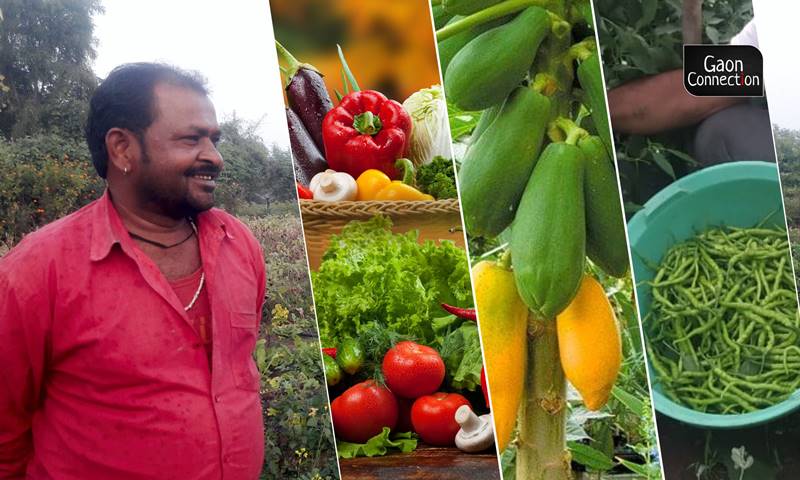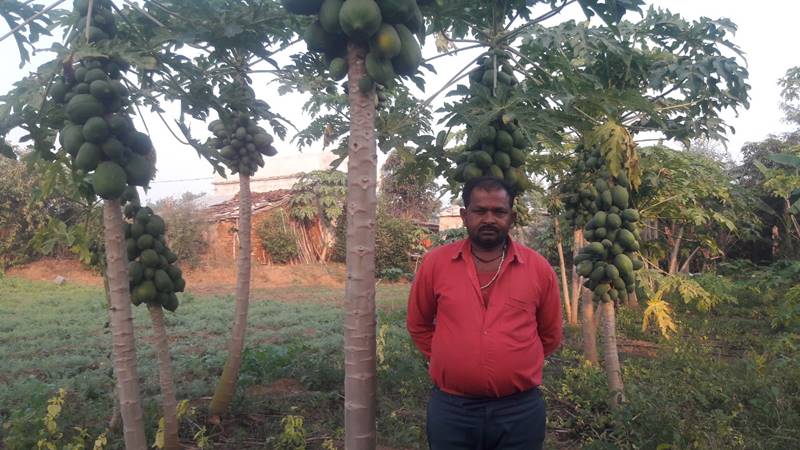Madhya Pradesh farmers say organic farming is profitable, and at the same time saves on medical bills
There is a steady rise in demand for organic produce and the pandemic has further reinforced the need for a healthier lifestyle, say farmers from Madhya Pradesh that leads in organic cultivation in the country.


Many farmers in the state are moving towards organic cultivation. All photos: Arun Singh
Panna, Madhya Pradesh
Till three years ago, Sant Kumar Kushwaha farmed like most others in his community, using chemical fertilisers and pesticides. He grew vegetables and he was more than satisfied with the yield. But, he said, he did spend a lot of money on the cultivation. It was then that Kushwaha happened to learn about organic farming. Horticulturist Sanjit Singh Bagri told him more about organic farming and showed him the way, said Kushwaha.
The happy farmer from Ranipur Tagra village in Panna district, pointed to his two-acre land where a variety of vegetables grow on soil that is completely free of chemicals. “Eating vegetables doused in chemicals and spending huge amounts of money on doctors’ hospital bills makes no sense and growing and eating organic vegetables and staying healthy is a much smarter thing to do,” Kushwaha told Gaon Connection.
“There is a growing demand for organic produce and my vegetables are sold out as soon as they reach the market. In fact, many people come to my farm to buy them off the field,” said the 41-year-old farmer who has gone completely organic since 2020.
Taking a leaf out of their uncle’s experiment with organic farming and the success he is enjoying with them, Kushwaha’s two young nephews, 22-year-old Surendra and 25-year-old Sachin have also adopted an organic approach to vegetable cultivation. They too cultivate two acres each.

Also Read: The journey from a cycle rickshaw driver to an organic farmer
“I easily earn about ten to fifteen thousand rupees a week, and sometimes more, and my nephews also make about the same,” Kushwaha said.
“It is heartening that many farmers in the state are moving towards organic cultivation,” Sanjit Singh Bagri, horticulture officer, Panna, who encouraged Kushwaha into going organic, told Gaon Connection. According to him in Panna, Ajaygarh and Shahangarh blocks had many such farmers who were practising organic cultivation.
While there is a rising awareness and demand for organic produce in the country, its cultivation is yet to take off full steam.
According to the ministry of agriculture and farmers welfare, till March 2020, there were 2.78 million hectares of land under organic cultivation, which is about 2 per cent of the total land under cultivation (140.1 million hectares). Madhya Pradesh leads the way in organic cultivation in the country with .76 million hectares of land under organic farming. Madhya Pradesh is also one of the 12 states that has the state organic certification agency recognised by the Agricultural and Processed Food Products Export Development Authority (APEDA).
“There has been an increase of farmers in the state seeking certification for tier organic produce,” GP Prajapati, director of Madhya Pradesh Organic Certification Agency, told Gaon Connection. “There is a growth of organic produce in the state especially of arhar dal, chickpeas, wheat and soybean among others,” he added. There are several agencies in Madhya Pradesh that are responsible for organic certification.
“In 2021, there have been 125 new applications for organic certification that are being processed. Many of the applications have come from farmers groups in the state,” Prajapati said.

Also Read: A village in Bihar switches to organic farming, sets an example
Meanwhile, in Kushwaha’s land, the rabi season tomatoes, cabbage, flat beas, brinjal, ivy gourd, okar, papayas, etc., are growing. In the kharif season he had sowed basmati rice in a little area where now he said he would plant peas.
Most of the work on the fields is done by family members, mostly himself and his wife Geeta, said Kushwaha. “If required I hire one or two farm labourers,” he said. There are three wells in his land with enough water for irrigating his crop, and he uses a power tiller instead of a tractor to plough his land. He said he had got the tiller for Rs 75,000 from the agriculture department and it was more than enough to tend to his small holding.
There are many farmers like Kushwaha in Madhya Pradesh and several non-profits are working with them on their journey of changing over to organic cultivation.
Also Read: Vocal For Local: An alliance with millets
“We are forming a network of organic farmers in the district and have in the first phase, identified thirty one villages in ten panchayats to work with. We are working towards documenting the work of the organic farmers in these villages,” Gyanendra Tiwari, regional coordinator of Samarthan, a nonprofit that works with organic farmers, told Gaon Connection.
“Those farmers who have not used chemical fertilisers or pesticides on their land for three continuous years should be registered as organic farmers, Tiwari said. “That is yet to happen,” he added.

According to Samarthan, farmers in Lakshmipur, Rakseha, Bilkhura, Jamunihai, Ahirguan, Rahunia, Makri Kuthar, Janwar, Sakariya and Mutwa Kala villages in Panna district have been identified as organic farmers. “It is hoped that they will be recognised as organic farmers by the administration, and benefit from government schemes. At the same time, this will also help them get a good price for their produce,” Tiwari pointed out.
Organic vegetable farmers have no separate market for their produce. They are sold in the common market as a result of which they do not get the right price for them. In order to help them get a better price and enable people who want to buy organic vegetables, a proposal has been prepared, asking for a separate market for the organic produce. “The proposal will be sent to the collector,” AP Suman, deputy director, agriculture department, Panna, told Gaon Connection. “Once there is an organic market, the farmers from nearby villages can come there to sell their produce.”
“It makes good sense to eat clean healthy chemical-free and indigenous vegetables. It saves on medical expenses,” Babulal Dahiya, who has devoted his life to organic farming and conserving indigenous seeds, and Padmashree awardee, told Gaon Connection.
“Indiscriminate use of chemical fertilisers and pesticides is of no benefit to the farmers. Remember, the farmer also has a family to take care of and feed,” Dahiya said.
Read the story in Hindi.

